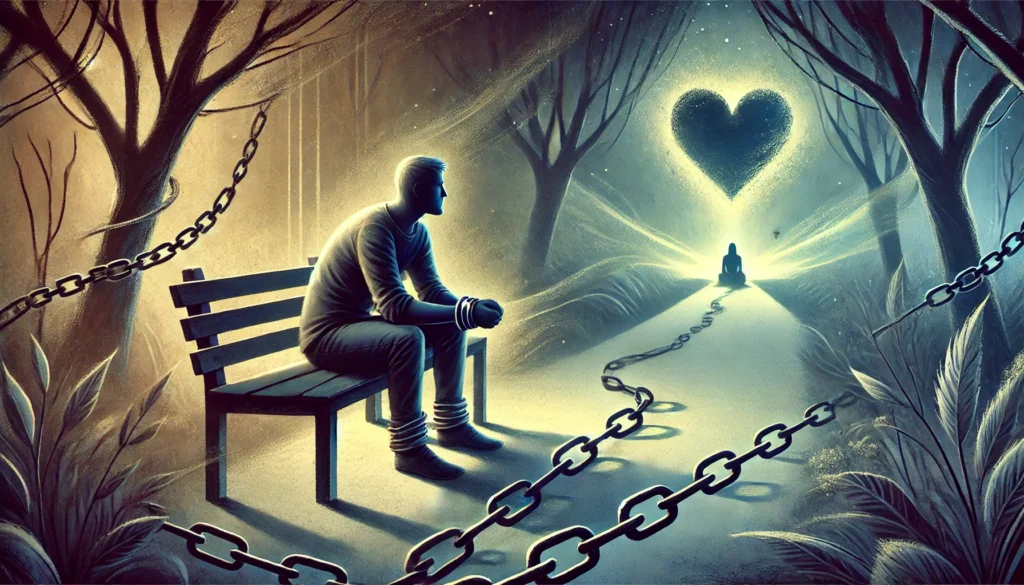
Understanding Emotional Attachment
Emotional attachment is a psychological phenomenon that influences human relationships profoundly. It refers to the strong emotional bond that individuals develop over time, often characterized by a sense of security and comfort. Unlike romantic love, which is typically marked by passion and desire, emotional attachment can exist in various forms, including familial bonds or friendships. This distinction is crucial in understanding why a man might remain with a woman despite lacking romantic feelings.
Attachment theory, pioneered by psychologist John Bowlby, offers valuable insights into the nature of emotional bonds. According to this theory, early interactions with caregivers shape one’s attachment style and influence how individuals relate to others in adult relationships. For men, a persistent emotional attachment may stem from a long shared history filled with emotional experiences, where the foundation of the relationship is built on trust, companionship, and mutual support. Even in the absence of romantic love, these fundamental elements can create a sense of loyalty and commitment.
Several factors can contribute to the decision of a man to stay in such a relationship despite the lack of romantic feelings. One significant aspect is the fear of loneliness, which can be a powerful motivator. Many individuals dread the prospect of being alone, prompting them to maintain the status quo rather than risk the emotional upheaval of a breakup. Additionally, emotional dependency can compel a man to stay in a relationship. If he relies on his partner for emotional validation or stability, leaving may be perceived as jeopardizing his emotional well-being.
In essence, emotional attachment can sustain relationships even in the absence of romantic love. Recognizing the impact of these emotional bonds can help in understanding the dynamics at play in such situations. By exploring the interplay between shared experiences, psychological factors, and emotional needs, individuals may gain a clearer perspective on why some men choose to stay despite their feelings evolving away from love.
Common Reasons Why Men Stay in Unloving Relationships
Relationships can be complex, and the reasons men choose to remain in situations where emotional affection is lacking can vary significantly. Understanding these motivations may illuminate the thought processes that guide their decisions, revealing insights into human behavior. One prevalent reason is the fear of change. Leaving a relationship often entails significant upheaval, which can be daunting. Men may prefer the familiarity of an unloving partnership rather than face the uncertainties of singlehood or entering the dating scene.
Emotional security plays a vital role as well. Some men find comfort in the stability of a long-term relationship, even if love is absent. This sense of safety can outweigh the absence of romantic love. Societal pressures also contribute to this phenomenon; men might feel compelled to remain in a relationship to adhere to social norms or expectations regarding commitment and long-term partnerships.
Conventional convenience cannot be overlooked. The logistics of sharing a life, from living arrangements to daily routines, can make separation seem excessively complicated. Financial implications play a crucial role, too, as the division of assets and potential loss of financial security can deter men from leaving. Concern for mutual friends or family also adds a layer of complexity; men may wish to preserve group dynamics or spare loved ones from potential discord.
For men with children, the presence of offspring often ties them to a relationship, creating a sense of duty and responsibility to maintain a united front for the children’s welfare. Additionally, a lack of viable alternatives can leave some men feeling trapped, as they may perceive their options in the dating market as limited. Health and wellness considerations are also relevant, particularly as reliable partners can provide emotional and logistical support during challenging times. Finally, misguided loyalty may lead men to stay in relationships, as they prioritize commitment over personal happiness. These factors intertwine, forming a web of emotions and rationalizations that keep men anchored in unloving relationships.

Consequences of Staying in a Loveless Relationship
When a man remains in a relationship without love, the emotional and psychological impacts can be profound and long-lasting for both partners. Initially, the most apparent consequence is emotional distress. The lack of affection and intimacy creates an environment ripe for feelings of sadness, loneliness, and frustration. This emotional burden often leads to increased resentment between partners, as one may feel trapped in a situation that lacks genuine connection and mutual fulfillment.
Communication tends to break down in loveless relationships. Couples may engage in superficial conversations or, in some cases, choose to avoid discussing their feelings entirely. This lack of open dialogue can foster misunderstandings and further alienate partners, perpetuating a cycle of emotional withdrawal. Consequently, issues that require resolution are often left unaddressed, deepening the rift that already exists between them.
Moreover, staying in such a relationship can stifle personal growth for both individuals. One partner might cling to the hope of rekindling love, diverting energy away from self-improvement or pursuing personal interests. The other, feeling unvalued, may experience stagnation in personal development, which amplifies the prevailing sense of unhappiness in the relationship. Over time, both partners may find themselves trapped in a state of emotional inertia, unable to envision a future beyond the bounds of their unfulfilling romance.
This challenging dynamic can also heighten the risk of infidelity. Feeling unloved or unappreciated, one partner may seek validation and intimacy outside of the relationship, culminating in betrayal and further emotional devastation. Additionally, the toll on a woman’s self-esteem is particularly concerning, as prolonged exposure to unreciprocated affection can lead to feelings of inadequacy and unworthiness. Hence, unfulfilled relationships create a detrimental cycle of unhappiness that affects both partners deeply.
Finding a Path Forward: Alternatives and Solutions
For men trapped in loveless relationships, taking steps toward improving their situations is crucial. The first step towards clarity often lies in self-reflection. One must consider the reasons behind their continued commitment despite a lack of love. Journaling thoughts and emotions can provide insights, helping one to understand personal motivations and the impact of their choices. Understanding the root of the disconnect can pave the way for informed decisions.
Another vital aspect of addressing this predicament is open and honest communication. Men should engage in dialogue with their partner to express their feelings, fears, and desires. It is essential to approach these conversations with sensitivity, aiming to understand the partner’s perspective while articulating personal needs. This transparency not only promotes emotional honesty but can also surface unresolved issues that may have contributed to the current state of the relationship.
Exploring the possibility of a breakup might be necessary if the connection remains unfulfilling. Although this can be daunting, recognizing that continuing in a loveless relationship may lead to greater unhappiness is crucial. A respectful and considered approach is important here, ensuring that both partners’ feelings are acknowledged during this challenging discussion.
Seeking professional counseling is another significant path forward. Therapy can provide guidance and support, facilitating discussions that might be too challenging to navigate independently. A trained professional can help individuals explore their emotions, improve communication skills, and devise strategies for future relationships.
Lastly, approaching new relationships with emotional honesty and preparedness is key. Building emotional intelligence and effective communication skills allows for more profound connections. Recognizing past patterns can enhance future interactions, nurturing healthier relationships grounded in mutual respect and love.
